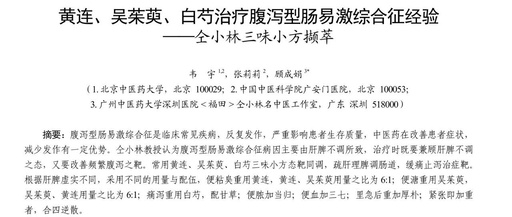Follow Us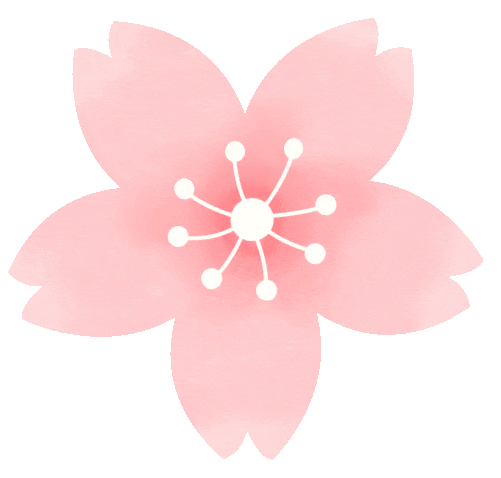
 PART.01Abstract
PART.01Abstract

 SPRING IS COMINGSPRING
SPRING IS COMINGSPRING
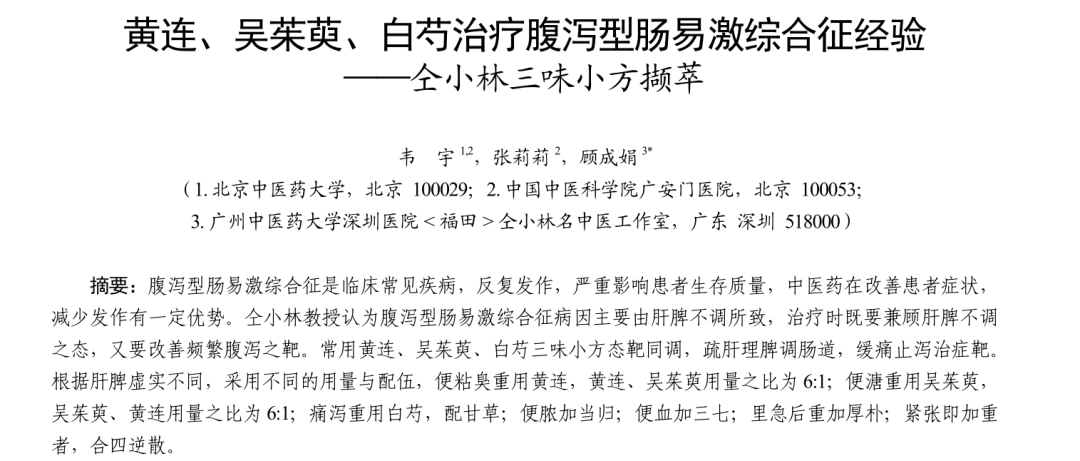
Diarrhea-type irritable bowel syndrome (IBS-D) is a common clinical condition that recurs frequently and severely affects the quality of life of patients. Traditional Chinese Medicine (TCM) has certain advantages in improving symptoms and reducing episodes. Professor Tong Xiaolin believes that the etiology of IBS-D is mainly due to disharmony between the liver and spleen. Treatment should address both the disharmony of the liver and spleen and the frequent diarrhea. Commonly used herbs include Huang Lian (Coptis chinensis), Wu Zhu Yu (Evodia rutaecarpa), and Bai Shao (Paeonia lactiflora), which work together to soothe the liver, regulate the spleen, and adjust the intestines, alleviating pain and stopping diarrhea. Depending on the deficiency or excess of the liver and spleen, different dosages and combinations are used: for sticky and foul-smelling stools, increase Huang Lian, with a ratio of Huang Lian to Wu Zhu Yu of 6:1; for loose stools, increase Wu Zhu Yu, with a ratio of Wu Zhu Yu to Huang Lian of 6:1; for painful diarrhea, increase Bai Shao, combined with licorice; for purulent stools, add Dang Gui (Angelica sinensis); for bloody stools, add San Qi (Panax notoginseng); for urgency after defecation, add Hou Po (Magnolia officinalis); for exacerbation due to stress, combine with Si Ni San (Frigid Extremities Powder).
PART.02Keywords

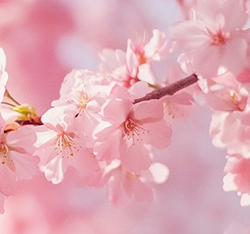 SPRING
SPRING
Diarrhea-type irritable bowel syndrome; Huang Lian; Wu Zhu Yu; Bai Shao; Tong Xiaolin
PART.03Etiology and Pathogenesis

 SPRING
SPRING
Irritable bowel syndrome falls under the category of diarrhea in TCM, with various etiologies and pathogenesis, including disharmony between the liver and spleen, spleen and stomach qi deficiency, kidney yang deficiency, dampness obstructing the middle jiao, and blood stasis obstructing the channels. Professor Tong Xiaolin believes that the main pathogenesis of diarrhea-type irritable bowel syndrome is disharmony between the liver and spleen, where emotional distress leads to liver qi stagnation, which in turn affects the spleen, resulting in symptoms such as abdominal pain and diarrhea, closely related to emotional state.
PART.04Treatment Principles

 SPRING
SPRING
Professor Tong Xiaolin proposes a targeted differentiation approach in treating diarrhea-type irritable bowel syndrome, addressing both the state of the liver and spleen and alleviating the symptoms of abdominal pain and diarrhea. The selection of Huang Lian, Wu Zhu Yu, and Bai Shao is based on adjusting dosages and combinations to achieve the goals of soothing the liver, regulating the spleen, adjusting the intestines, and alleviating pain and stopping diarrhea.
PART.05Herbal Analysis

 SPRING
SPRING Huang Lian (Coptis chinensis)Properties: Bitter, cold. Channels: Heart, liver, stomach, large intestine.Effects: Clears heat, dries dampness, purges fire, and detoxifies.Application: Huang Lian is effective in drying dampness due to its bitterness and removing heat due to its cold nature, suitable for diarrhea and abdominal pain caused by damp-heat in the intestines. Modern pharmacological studies show that Huang Lian has antibacterial, antitoxic, and anti-diarrheal effects, with its main component, berberine, capable of regulating intestinal flora and improving gastrointestinal function.Wu Zhu Yu (Evodia rutaecarpa)Properties: Pungent, bitter, hot; slightly toxic. Channels: Liver, spleen, stomach, kidney.Effects: Dispels cold, alleviates pain, descends qi, stops vomiting, and assists yang to stop diarrhea.Application: Wu Zhu Yu enters the liver channel, promotes qi circulation, and is suitable for abdominal pain and diarrhea caused by liver qi stagnation. Its warm nature can warm yang and stop diarrhea. Modern pharmacological studies indicate that Wu Zhu Yu decoction can inhibit gastrointestinal contractions, relieve intestinal spasms, and promote intestinal absorption.Bai Shao (Paeonia lactiflora)Properties: Sweet, bitter, sour, slightly cold. Channels: Liver, spleen.Effects: Nourishes blood, regulates menstruation, astringes yin, stops sweating, and softens the liver to alleviate pain.Application: Bai Shao astringes and nourishes spleen qi, nourishes blood, softens the liver, and alleviates pain, suitable for abdominal pain and diarrhea caused by liver-spleen disharmony. Modern pharmacological studies show that Bai Shao has antidepressant, liver-protective, analgesic, and anti-inflammatory effects, providing protective effects on the gastrointestinal tract.PART.06Combination Variations
Huang Lian (Coptis chinensis)Properties: Bitter, cold. Channels: Heart, liver, stomach, large intestine.Effects: Clears heat, dries dampness, purges fire, and detoxifies.Application: Huang Lian is effective in drying dampness due to its bitterness and removing heat due to its cold nature, suitable for diarrhea and abdominal pain caused by damp-heat in the intestines. Modern pharmacological studies show that Huang Lian has antibacterial, antitoxic, and anti-diarrheal effects, with its main component, berberine, capable of regulating intestinal flora and improving gastrointestinal function.Wu Zhu Yu (Evodia rutaecarpa)Properties: Pungent, bitter, hot; slightly toxic. Channels: Liver, spleen, stomach, kidney.Effects: Dispels cold, alleviates pain, descends qi, stops vomiting, and assists yang to stop diarrhea.Application: Wu Zhu Yu enters the liver channel, promotes qi circulation, and is suitable for abdominal pain and diarrhea caused by liver qi stagnation. Its warm nature can warm yang and stop diarrhea. Modern pharmacological studies indicate that Wu Zhu Yu decoction can inhibit gastrointestinal contractions, relieve intestinal spasms, and promote intestinal absorption.Bai Shao (Paeonia lactiflora)Properties: Sweet, bitter, sour, slightly cold. Channels: Liver, spleen.Effects: Nourishes blood, regulates menstruation, astringes yin, stops sweating, and softens the liver to alleviate pain.Application: Bai Shao astringes and nourishes spleen qi, nourishes blood, softens the liver, and alleviates pain, suitable for abdominal pain and diarrhea caused by liver-spleen disharmony. Modern pharmacological studies show that Bai Shao has antidepressant, liver-protective, analgesic, and anti-inflammatory effects, providing protective effects on the gastrointestinal tract.PART.06Combination Variations

 SPRING
SPRING Based on the patient’s symptoms and the deficiency or excess of the liver and spleen, adjust the dosages and combinations flexibly:Sticky and foul-smelling stools: Increase Huang Lian, with a ratio of Huang Lian to Wu Zhu Yu of 6:1.Loose stools: Increase Wu Zhu Yu, with a ratio of Wu Zhu Yu to Huang Lian of 6:1.Painful diarrhea: Increase Bai Shao, combined with licorice, using Shaoyao Gan Cao Tang (Peony and Licorice Decoction) to alleviate pain.Purulent stools: Add Dang Gui.Bloody stools: Add San Qi.Urgency after defecation: Add Hou Po.Exacerbation due to stress: Combine with Si Ni San.PART.07Case Example
Based on the patient’s symptoms and the deficiency or excess of the liver and spleen, adjust the dosages and combinations flexibly:Sticky and foul-smelling stools: Increase Huang Lian, with a ratio of Huang Lian to Wu Zhu Yu of 6:1.Loose stools: Increase Wu Zhu Yu, with a ratio of Wu Zhu Yu to Huang Lian of 6:1.Painful diarrhea: Increase Bai Shao, combined with licorice, using Shaoyao Gan Cao Tang (Peony and Licorice Decoction) to alleviate pain.Purulent stools: Add Dang Gui.Bloody stools: Add San Qi.Urgency after defecation: Add Hou Po.Exacerbation due to stress: Combine with Si Ni San.PART.07Case Example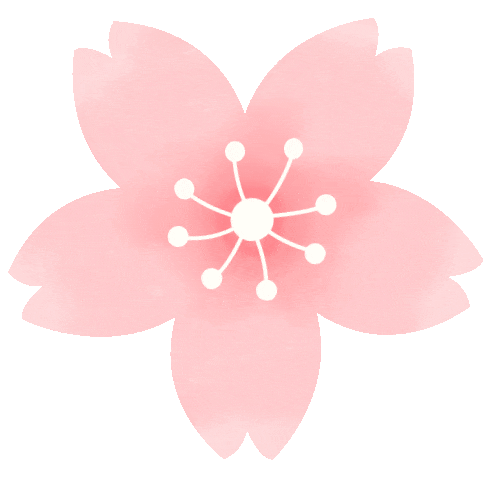

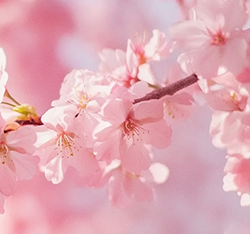 SPRING
SPRING
Li, male, 72 years old, has a history of diabetes for over 10 years and lacunar cerebral infarction. He presents with swollen and painful gums, chest tightness, irritability, hiccups when feeling down, headaches, abdominal pain, and defecation twice daily with sticky, foul-smelling stools, a sensation of incomplete evacuation, and occasional fecal incontinence. His tongue is pale with a yellow thick coating, and his pulse is wiry and weak. Auxiliary examination shows a glycosylated hemoglobin of 7.7% and blood glucose of 9.15mmol/L. Western diagnosis is type 2 diabetes and irritable bowel syndrome, while TCM diagnosis is diabetes with damp-heat syndrome, with symptoms of liver-spleen disharmony and intestinal damp-heat. Prescription: Huang Lian 15g, Wu Zhu Yu 9g, Bai Shao 15g, Ge Gen (Pueraria lobata) 30g, Huang Qin (Scutellaria baicalensis) 15g, Qing Ban Xia (Pinellia ternata) 15g, E Zhu (Curcuma zedoaria) 9g, Zhe Bei Mu (Fritillaria thunbergii) 9g, San Qi 9g, Huang Qi (Astragalus membranaceus) 24g, Dang Shen (Codonopsis pilosula) 9g, Sheng Jiang (Ginger) 15g. After treatment, symptoms significantly improved, and glycosylated hemoglobin decreased to 7.4%.
 SPRING IS COMING
SPRING IS COMING END
END

